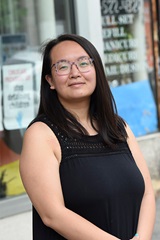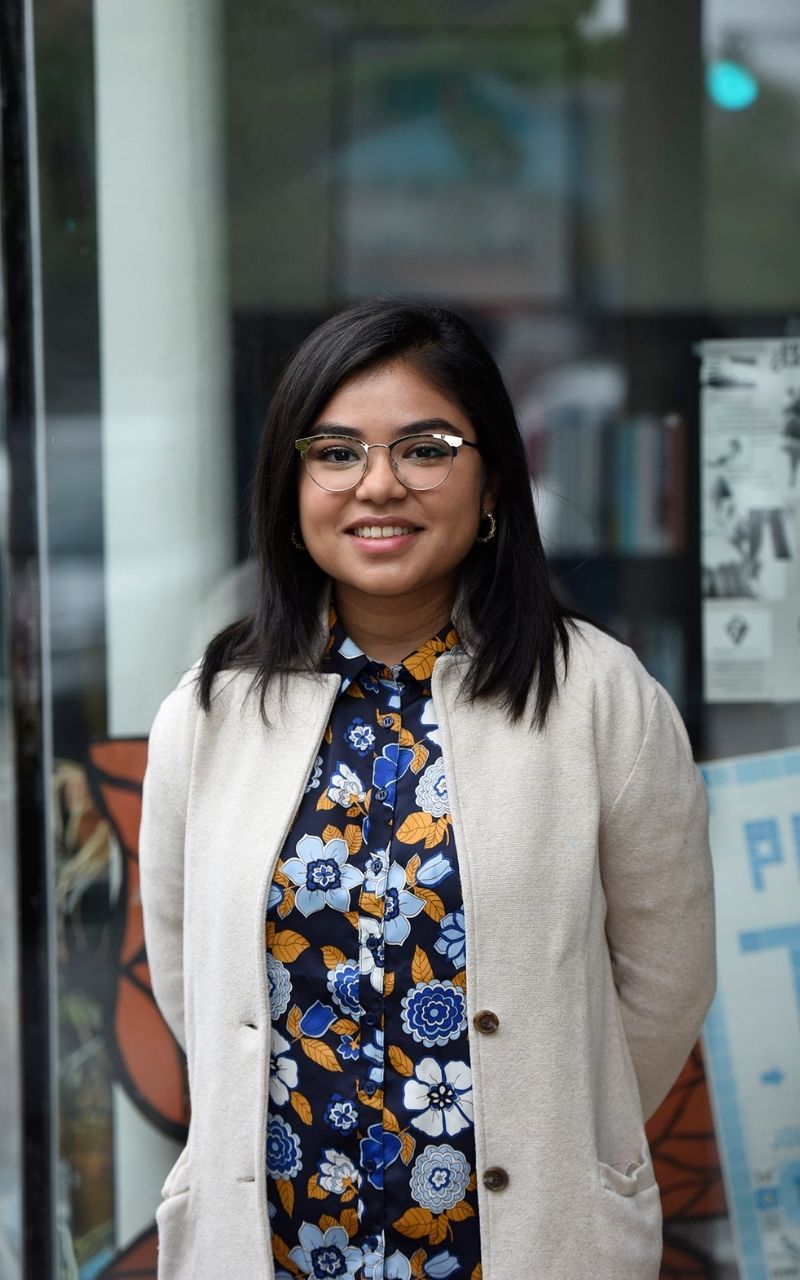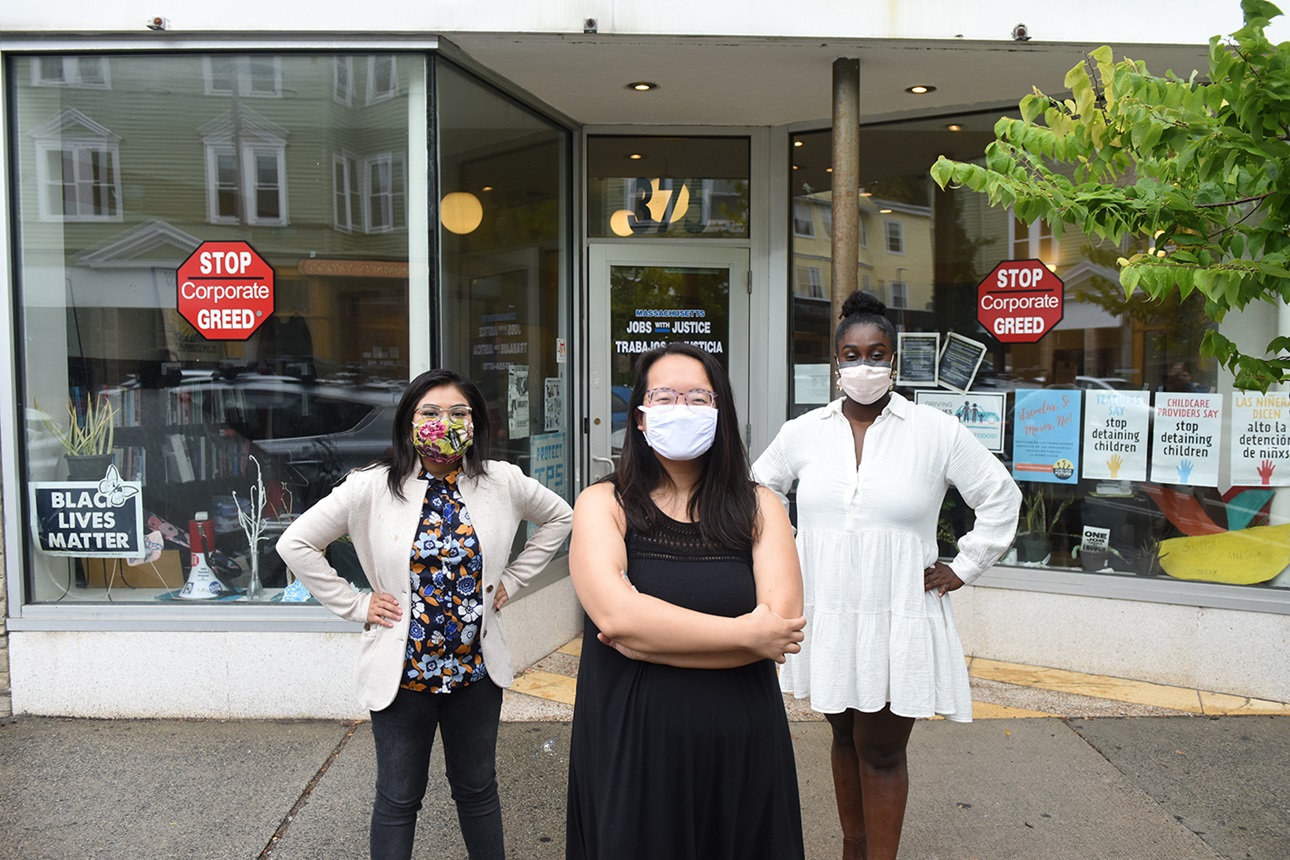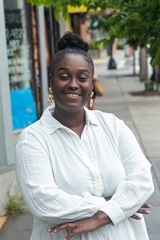If We Build the Movement
Gloribel Rivas
Volunteer, Jobs With Justice
Legislative Aide, Rep. Adrian Madaro
Tell us about how you found yourself here in Boston.
I was born in El Salvador and I came to the United States when I was five years old. I came to this country as an undocumented immigrant with my sister and my mother. We came to the United States to reunite with my father, who had been living here. We were very poor in El Salvador; we didn’t have many opportunities. My mother realized that if we stayed there, my sister and I wouldn’t have a good future, so she decided to move here permanently.
I grew up in East Boston and attended the Boston Public Schools. I went to Boston Latin School for high school. It was definitely a very competitive place. I graduated from Boston Latin in 2015. When I was in high school, I went to a workshop that Lily [Lily Huang, Executive Director of Jobs With Justice] facilitated on social justice.
What drew you to Lily’s workshop?
I saw Lily’s session online and I was beginning to get more interested in social justice. I had always been curious about the way that economic injustice impacts us. My parents are union members; they are janitors in Boston. They work in skyscrapers in the city. I grew up poor and I knew the impact that had on me—especially at a place like Boston Latin School, where so many of my peers had parents who could enroll them in very expensive tutoring to help them with their classes. I had parents who didn’t know how to navigate the public school system. I grew up feeling that a lot of the things that were happening to me just didn’t feel right. I would hear a student at Boston Latin say, “My dad got me an internship at such and such a place, because he used to work there.” We were just high school students, but I started realizing how much is stacked up against poor kids, especially in the public school system, so I became more interested in learning about income inequality and racial justice, based on these incredible discrepancies between the resources that were available to me and the resources that were available to my peers. They would talk about going to expensive colleges and the achievements they needed in high school to help them get there, which showed the social capital they had. So, when I saw that Lily was hosting this workshop on social justice, I became really excited. It turns out that she creates a space for so many young people to be involved and she gives us all a voice.
Her workshop was one of the first times that I was really moved to look at social justice issues related to my community and the communities around me. That was a transformative moment, because I began to realize how a lot of history and social power structures had sort of caused the outcomes that a lot of us experience.
Lily and everyone associated with Jobs With Justice were really welcoming and I began to explore bonds with them and many people in my community. I later worked on different issues with them, whether it be housing or immigrant justice work. It was an incredible way to learn about issues that were happening and to meet a lot of people who I would later meet in other circles.
So, you began working with Jobs With Justice on a volunteer basis?
I applied for a Seevak Fellowship [Seevak Human Rights and Social Justice Summer Fellowship provides an opportunity for a select group of juniors and seniors who have completed the Facing History course at Boston Latin School to work for eight weeks over a summer at a human rights or social justice nonprofit.] through my high school, which was created for students who were interested in social justice and so, for the summer after my senior year, I was placed at City Life. [City Life/Vida Urbana is a nonprofit in Jamaica Plain that provides free guidance for people facing foreclosure or eviction and advocates for sustainable, accessible and affordable communities.]
At City Life, I became involved in housing justice work, and after my internship, I stayed on and I continued to volunteer throughout my time in college. City Life did a lot of work in conjunction with Jobs With Justice and so I continued to do work with JWJ. I remember during my internship when my supervisor said that we were going to go to a protest against poor labor relations at McCormick and Schmick at Faneuil Hall.
Jobs With Justice (JWJ) was picketing in front of the restaurant and there were Lily and Gillian [Gillian Mason also works at Jobs With Justice]. They said they were going to go inside the restaurant and asked me to join them. It was the first time that I had done anything like that. And so, we went inside the restaurant and marched around as people were eating, but hearing our message. The restaurant owner threatened to have us arrested, but I felt really safe and empowered, because Lily and Gillian were there. It was an incredible and powerful experience.
We heard from some of the workers who had been sexually harassed and intimidated by their supervisors at McCormick and Schmick. It was very disturbing to hear the things that the women had been subjected to, but having Jobs With Justice and others supporting them, it really empowered them to come forward. [Read the Sophia Hall transcript for more on this case.]
I continued to volunteer with JWJ. In 2018, JWJ held a really big rally against the Trump administration’s treatment of immigrants and I volunteered to serve as one of the people who would stand between the white supremacist agitators and the people who were participating in this peaceful protest. That taught me the de-escalation tactics that groups like Veterans for Peace use to ensure that people are safe and can engage in peaceful protests without being agitated by these white supremacist groups.
More recently, when I was working with State Representative Adrian Madaro as one of his legislative staff, we reached out to Lily to help when we realized that there would be so many undocumented families that would suffer during the pandemic. [She is referring to Lily Huang, Executive Director of Jobs With Justice]. We knew that so many people were going to lose their jobs. A great number of people in our district work in the service industry, in restaurants and building facilities, etc. We knew that they were going to lose income and that that was going to have a really horrible impact on their ability to retain housing and pay their bills and feed their families. So, we reached out to Lily because she was the best person we could think of to address this problem. Within a week, MassUndocuFund was created by JWJ along with the Matahari Workers’ Center and One Fair Wage to deliver cash assistance to undocumented families. The MassUndocuFund gives relief funds to undocumented families and workers who have lost their jobs, but do not qualify for unemployment benefits or stimulus checks.
"It was very disturbing to hear the things that the women had been subjected to [at McCormick & Schmick], but having Jobs With Justice and others supporting them, it really empowered them to come forward."
Through MassUndocuFund, I’ve been making calls to people who are undocumented and have lost their jobs or income during the pandemic, but have not qualified for unemployment.
Do you enjoy being a Legislative Aide?
Yes, but it’s been very challenging with the pandemic. I do a mix of things, such as constituent services, which includes helping people access unemployment benefits, for example. I serve as a liaison between the Department of Unemployment Assistance and residents and ensure things are working properly. I also work with people who need housing and people who need assistance with issues related to
the RMV. Then I also help with social media and communications, ensuring that information about our work is getting out to the community. For the first time, we’ve been able to provide information in Spanish, which I feel really good about, because more than 50 percent of East Boston’s residents are Latinx and many only speak Spanish. Then, there is budget work—trying to get things in the budget. It’s a challenging job, but it’s definitely rewarding. And I like working for Rep. Madaro who represents my home town of East Boston. I attend a lot of community meetings to ensure our office stays abreast of the community’s concerns and I also provide input on policy.
I worked at a law office for a year after college and that was a really interesting experience; long work hours, but I wanted a job where I could be more involved in the community and continue some of the work I had been doing in college.
Let’s back up a little and talk about your college years.
I went to the University of Massachusetts Boston and I majored in history and minored in English. I was in the Honors College. It wasn’t totally related to the work that I was doing outside of school, but I’ve always liked history, especially social history, because it helps to explain how we got to where we are now—how the foundation was laid for the systemic issues we have. While in college, I worked in a supermarket to pay for my bills and tuition. I volunteered at City Life throughout the year and I also volunteered at Greater Boston Legal Services (GBLS) for one summer. So, I was definitely very interested in housing justice work.
After college while I was working at a law office, I heard through a friend that Rep. Adrian Madaro was hiring and I knew that he represented my community, so I applied and I got the job. There is a greater need for constituent services in communities like East Boston, so some offices have more of that work than others. So, I’m happy to be able to do my part and to also be able to help people who speak only Spanish. It is very fulfilling.
Do you think you might want to be in the political arena going forward?
I definitely enjoy the background work. I think making sure that our government is as accessible and transparent as possible to all communities is something that I’ve become very passionate about. I’ve been supporting an effort called Beacon B.L.O.C., where Black staffers in the State House have come together to demand a more inclusive working environment. And so, I’ve been supporting that in any way that I can. We’ve had discussions with Leadership and I think all of the work of my Black colleagues has really made me think a lot about how inaccessible our government can be and how transparent it should be for people of all backgrounds. So, any way that I can continue to lift up that work is appealing. I’d really love to continue to be involved in politics, but I also want to go to law school. I’m interested in pursuing public interest law. I have a lot of admiration for public interest attorneys, so I want to pursue that work. I think it’s very impactful.
You said that you were undocumented when you came here. Are you still?
No, I’m no longer undocumented. I was pretty lucky. My father had been here since the ‘80s and he was able to obtain this thing called NACARA, which was relief for people who had applied for asylum from countries that had been involved in the Cold War. He came in the ‘80s around the time of the Salvadoran Civil War and applied for asylum. A lot of people were getting denied from those countries, so I think there was a lawsuit against the Reagan administration because there were concerns about the way those applications were being processed. So, then out of that came NACARA, which my dad was able to obtain. My sister, my mother and I were able to benefit from it too.
We’re clearly in one of the most tumultuous times in American history and Boston’s history. When you step back a little and think about Boston’s future, what are the issues that rise to the surface for you as among the most urgent?
That’s a great question. I’m biased toward the world of housing justice. I think housing is a human right and everyone deserves a roof over their heads regardless of their circumstances. In high school I started seeing a lot of families working two and three jobs and still unable to make their rent. And that really hit me because I grew up in a rental household and my parents talked about how difficult it was to make the rent and the sacrifices we had to make to pay for it. So, to see those struggles magnified to a level so acute that people working two or three jobs are struggling to keep a roof over their heads, is really painful to see, especially when there are so many children involved. Over the years, I’ve seen that situation continue to grow to the point where everyone is talking about it now and it’s not just the people who are the most neglected and oppressed. So, I think housing is a really big issue and people have talked about different ways to address it, whether that be through increased production or protections. I think we need a whole host of solutions on the table and it needs to be really comprehensive, just because so many people are suffering on that front.
So, housing is a big one for me. And then, more generally, I think a lot of us who grew up in Boston, especially those of us who went to regular public schools, and didn’t have the opportunity to have great quality education during our entire lives. My elementary school was a failing school and I remember getting a proficient on my MCAS and that being a big deal because so many of my peers had gotten failing grades, or got “needs improvement.” So, I was doing well in a failing school. But, when I got to college, I did find that so many of my peers weren’t even able to make it there. And we started off at the same place.
And I think it’s especially challenging when you have a lot of students coming into the BUs and the BCs and the Tufts from really well funded suburbs and they’ve had a lot of opportunities that we didn’t have and so now we’re competing in the same job market, but we started in a different place. There is also a lot of division between those two groups. I think that people who moved into Boston after attending college occupy a bigger space in our public discourse, as opposed to those of us who grew up here. I’m sure you’ve seen the articles on the valedictorians from the Boston Public Schools who ended up homeless or struggled to complete college. And I just think that is a really big issue, for me, at least.
What do you think are the important character traits when it comes to leadership?
I think leaders who are able to listen and take constructive feedback and engage with people with whom they don’t necessarily have a lot in common are really effective. And leaders who are open to feedback and criticism; I think that’s really important. Especially if they can take that feedback and make something really constructive out of it.
I think leaders with more diverse experiences are needed. We need more leaders of color; we need more women leaders… Our experiences are not reflected in a lot of our decision-making structures. So, we need more leaders to be sure that everyone is represented equally.
Do you have hope when you think about the future?
I have a lot of hope in my generation and the generation below me, so I’m hopeful.




